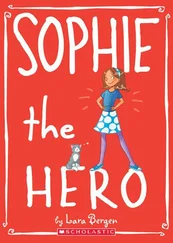Vica wished she could talk to somebody about it. Vadik had proved to be useless. He had neither confirmed nor disproved that she had been right to throw Sergey out. Regina? Vadik kept singing her praises about how wise she was, how full of empathy, how much she had helped him with his love problems throughout the years. But to ask Regina about Sergey? Regina, who must be gloating?
She talked to her mother.
“You’re such a pathetic idiot!” Vica’s mother yelled into the phone. Vica mumbled the same explanation she had attempted to give to Vadik: how it was getting unbearable, how both of them were on the verge of hating each other.
“Just tell me, how can this possibly be good for you?” her mother asked. “You’ll be worse off financially, you’ll have to work even more, and you’ll be all alone. Any husband is better than no husband!”
Vica’s father was that “any husband”: a quiet alcoholic who liked to sing and weep when drunk; he would sing and weep himself into oblivion until he fell asleep right at the table.
“I might meet somebody else,” Vica said.
“Good luck with that!” her mother retorted before slamming down the receiver.
Still, Vica’s worst fear was that the separation would affect Eric in some irreparable way. He seemed fine, but who knew what went on inside his head?
“Are you sure you’re not cold?” she asked Eric again. He shook his head.
“Hey, look!” Vica said. “Those dogs are funny.” A skinny girl of about sixteen was walking a pack of four dogs: a rottweiler, two golden retrievers, and a small furry dog of unknown breed. The small one must have been intimidated by its peers, so it was doing everything possible to keep apart from them, stretching the rope, making the walker stumble.
Eric looked at the dogs, then up at her with surprise, because this was something that his dad would say, not his mom. Sergey had a special bond with Eric over funny animals. He would always point them out to Eric, and Eric to him. He would send Sergey links to various photos: “Dad, look at that furry pig!” or YouTube videos: “That’s a real live killer rabbit!” And Sergey would take him to countless zoos, natural history museums, and aquariums to look at dinosaur bones, Galápagos turtles, and thousand-year-old fish. Eric had developed this passion for weird animals when he was four or five. He didn’t have many friends then. (Well, he hardly had any friends now. Just that fat freak Gavin.) It would break Vica’s heart when she watched Eric approach a kid on a playground to show him his toy dinosaur and explain how it used to be the most dangerous predator some millions of years ago, and the kid would laugh at him and run off, or kick the toy out of his hands and then run off. She always encouraged him to do sports, to play with other kids, to be more sociable, more normal. And it would break her heart to watch Eric run up to Sergey after work and tell him about the amazing discovery he had made — that dinosaurs looked just like chickens or some such — and Sergey would listen to him, as if it was okay to be interested in all that shit!
“Yeah, funny,” Eric said and turned away. He was clearly not in the mood for talking.
Vica decided to study the parents in the line. You could easily divide them into two categories: Susan Sontag types and Outer Borough types. Vica knew who Susan Sontag was from Vadik’s Tumblr. He once posted her photograph with a quote: “ ‘The truth is balance, but the opposite of truth, which is unbalance, may not be a lie.’ ”
Here, in the Castle line, the Sontag types were all about fifty years old, wore no makeup, had various amounts of gray in their hair, and had roughly the same amount of intellectual flair. Their clothes looked elegant yet comfortable, a sure sign that they were very, very expensive. Some of the Sontags were beautiful, others were not; a lot of them were Asian; a few of them were men. The Outer Borough types wore puffy jackets and knitted hats. There were a few more men among them: the non-white men were wearing suits under their jackets and dressy shoes, while the white men were wearing jeans and work boots, unless they were Russian — then they were wearing the same clothes as the non-white Outer Borough men. The phrase “deep social divide” darted through Vica’s mind, but she was too tired and sleepy to think it through or even to use it in a complete sentence. Vica herself wore a fuchsia-colored puffy jacket, but that didn’t mean that she belonged with the Outer Borough types, and the fact that she lived on Staten Island didn’t mean anything either. It wasn’t her fault that she lived on Staten Island. Vica’s personality was pure Manhattan. It’s just that her financial situation wasn’t.
Although to be perfectly honest, Vica didn’t belong with the Sontag types either, not because she lacked the intellectual flair but because she was only thirty-five years old and didn’t have any gray in her hair.
None of that mattered though. What mattered was that this was one of the best schools in the city — and possibly in the entire country — and the only truly democratic one. All you had to do was pass the test, and if you were smart enough to pass it, you were guaranteed a spectacular free education that led to Ivy League colleges, Ivy League graduate schools, and then unfailingly to superior lives. The problem was that admission wasn’t as democratic as it seemed. Some parents could afford tutors who’d been shoving intelligence down their children’s throats for years and other parents couldn’t. Eden, Vica’s boss at Bing Ruskin, had a son in this school. Vica had heard Eden bragging to her friend Dr. Jewell that they had spent fifteen thousand dollars for tutoring so that their son would pass the exam. “But just think how much we saved in private school tuition!” she’d said. The maddening thing was that Eden and her husband could afford the tuition. So by paying for a tutor they had robbed some equally smart poor kid of the opportunity to attend this school. That was unfair! That was so unfair! And Eden wasn’t even aware of it.
Of course, if she and Sergey had enough money, she wouldn’t hesitate to hire a tutor too. This would have put Eric at that same unfair advantage. It’s just that Vica didn’t find unfairness toward others quite as painful as unfairness toward herself.
Several years ago Eden threw a Memorial Day barbecue for all of the diagnostic radiology employees at her beautiful farm near Princeton (she had the farm in addition to her huge Manhattan apartment). Real farm — goats and all. Vica had been really looking forward to that picnic. She liked Eden. Eden was fairly young, beautiful, and worldly, and Vica really wanted to see her in a social setting; she even hoped that they could become friends. Why couldn’t they? Eden was a doctor, just as Vica would have been, if she’d had the chance to finish medical school. And maybe Eric could become friends with Eden’s sons.
Vica decided to create the most elegant hostess gift for Eden. She bought a beautiful wicker basket at Pier 1, fitted it with a blue and white linen towel, and filled it with the most perfect strawberries she could find in Staten Island’s Stop & Shop.
She thought she looked amazing when she parked her car and stepped onto Eden’s lawn. She was wearing a tight low-cut tank top, a jeans miniskirt, pink high-heeled sandals, and a straw hat with a wide pink band. The outfit, combined with her basket of strawberries, was the very picture of country chic. Then the first thing that Vica noticed was strawberry patches all over the place, thousands, millions of strawberries. Eden was very polite about it: “Strawberries — how lovely!” she said. “Ours are not ripe yet.” The second thing that Vica noticed were the beige shorts and loose white T-shirts that everybody, including Eden, was wearing. Oh, yes, and baseball hats. “Nice hat!” Santiago, who operated their C-scan machine, said with a smirk. Vica took her straw hat off and put it on a bench by the house, next to her basket.
Читать дальше












